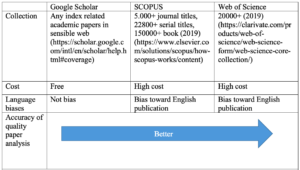Differences between h-index in Google scholar, SCOPUS and Web of Science
h-index is highly depending on the citations. The higher h-index, it means that the author is highly recognised and has extensive bibliometric and historic trend analysis.
Google Scholar includes academic papers/ publications which are not indexed by competitive publisher and from sensible websites. Since it is free, Google Scholar has a much wider coverage and has no linguistic biases. Therefore, any paper/ publication can easily be published and cited in Google Scholar. Different from Google Scholar, SCOPUS only do indexing for the articles published in journals affiliated with its databases. SCOPUS has coverage through tool as Scimago Journal & Country Rank which allows the realization of free bibliometric analysis. Additionally, SCOPUS also involve costing in publication. Meanwhile, Web of Science indicate high standard journal with high cost which has much more restricted coverage compared to SCOPUS.
It seems that Google scholar has larger database than SCOPUS and Web of Science. However, Google Scholar is still not as high-level and accurate as Web of Science or SCOPUS when performing proficient bibliometric analysis. From my overview, Google Scholar is a young but very favourable tool that has the capability to assist the scholars in observing and monitoring their capabilities. However, to maintain the excellence in publishing, it is really important to preserve and sustain the quality. Note that the smaller the database is, the better in publication quality. But to achieve excellency in publication from a developing country, publishing in Web of Science could be very challenging. Thus, from my opinion, it is good and suitable enough if I could publish in a SCOPUS indexed journal/conferences.
References:
1) https://www.researchgate.net/post/ISI_Web_of_Knowledge_vs_Scopus_vs_Google_Scholar
2) https://clarivate.com/products/web-of-science/web-science-form/web-science-core-collection/
3) https://www.elsevier.com/solutions/scopus/how-scopus-works/content
